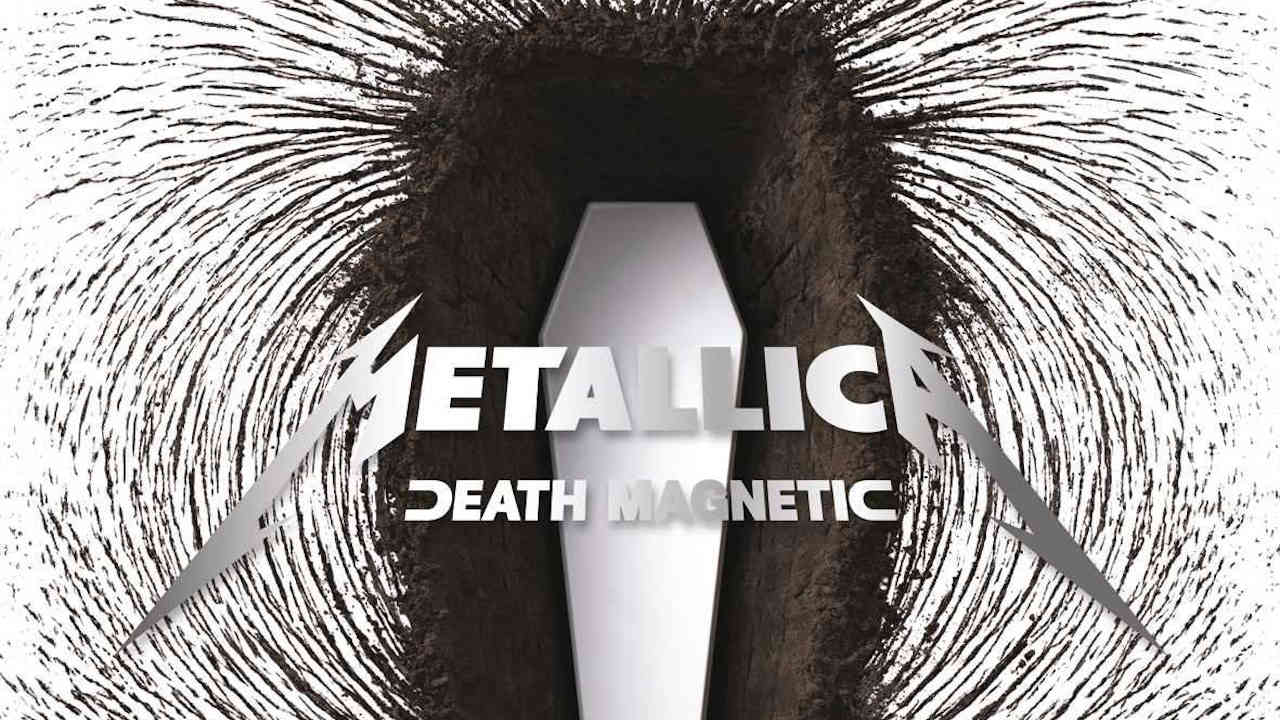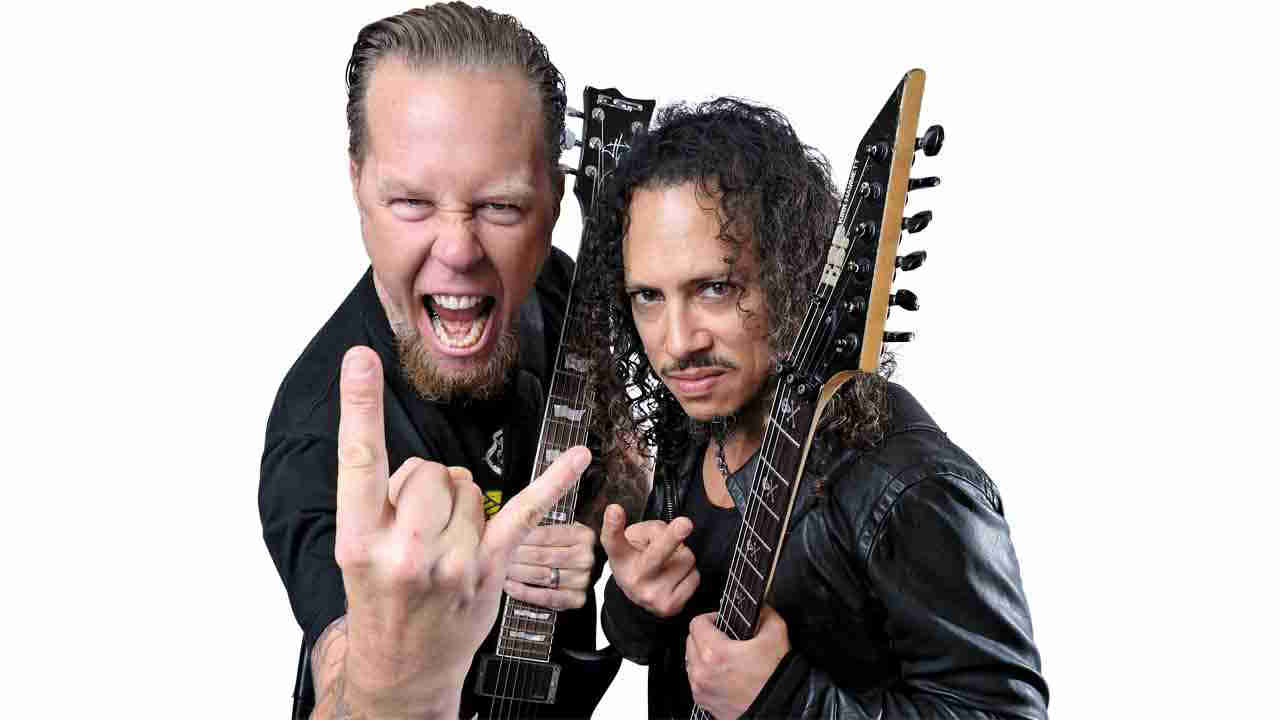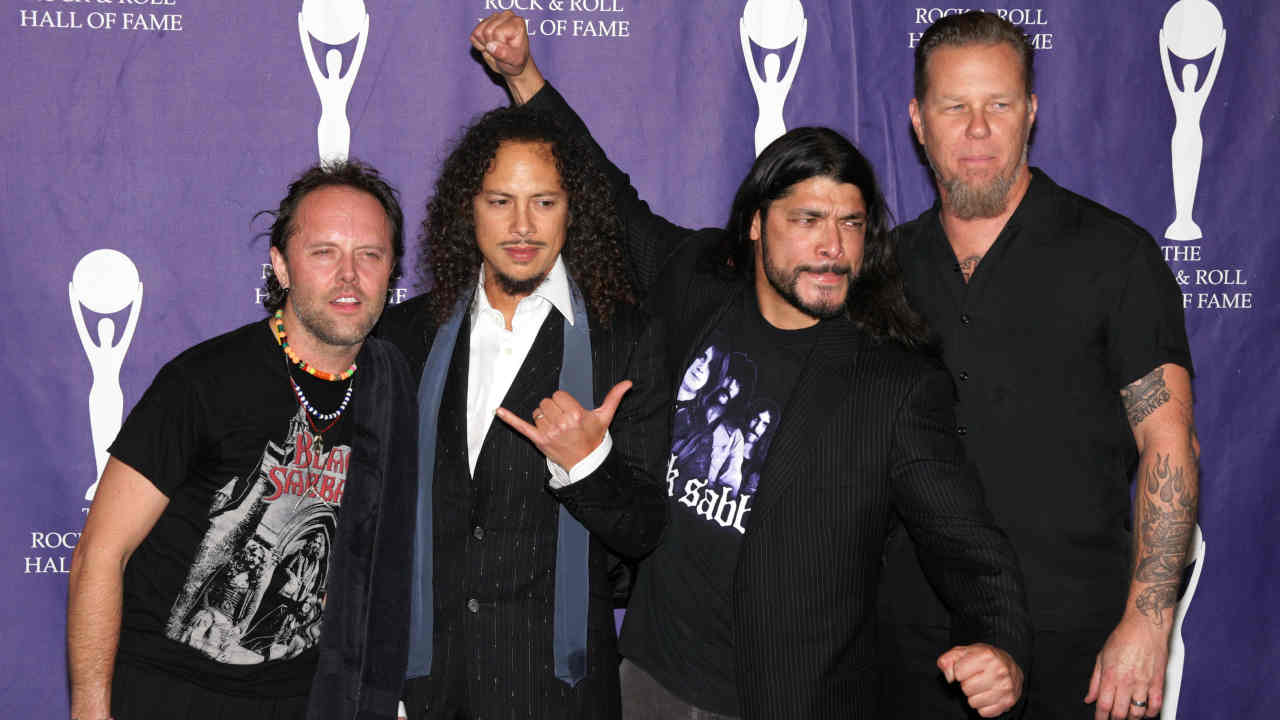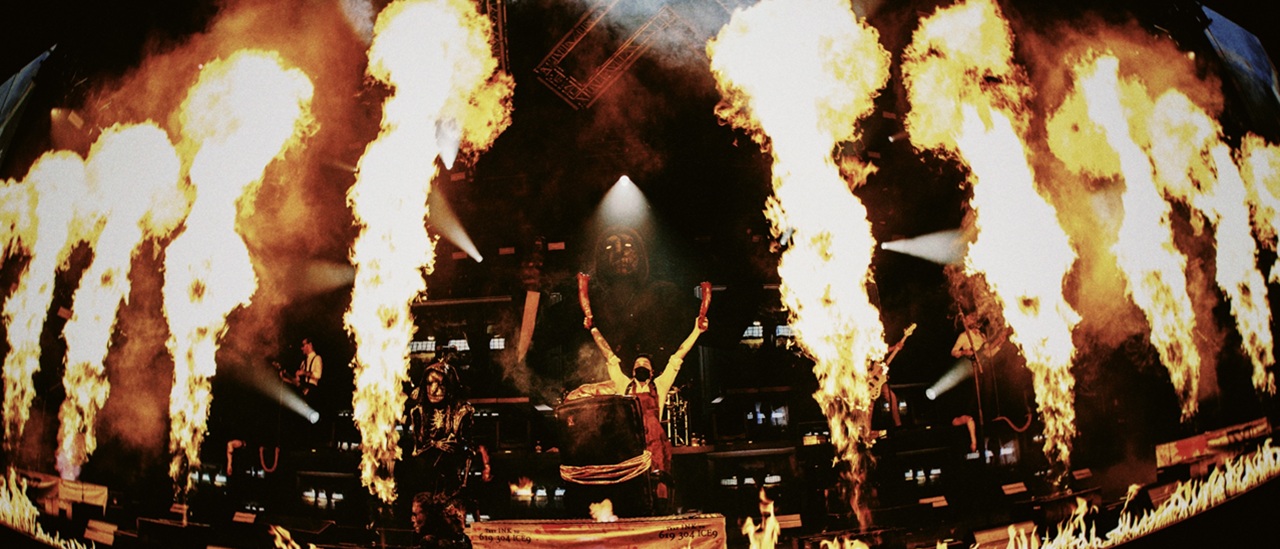Metallica’s Death Magnetic: how the kings of metal reclaimed their throne
After a decade of controversy and near-implosion, Metallica seriously needed to right the ship. With Death Magnetic, they did just that

Will the real Metallica please stand up? Let’s be honest. That’s the question burning on everyone’s lips in 2008.
Drummer Lars Ulrich sidles up to us wearing a vintage Budgie T-shirt and sipping a giant strawberry milkshake. He seems to have been reading our thoughts.
“I was talking to my friend [Machine Head frontman] Robb Flynn the other day and he said something that really surprised me,” he reveals. “He had a friend who wanted to interview me. ‘He thinks you’re an unapproachable rock monster,’ Robb told me. Well, I’ll take an hour out of my day to do an interview with anyone who thinks I’m a rock monster. It just isn’t true. Most people who come into contact with Metallica say, ‘You guys are so normal and nice.’ Of course we are! We’re just a friendly neighbourhood rock band.”
Hang on a minute. A friendly neighbourhood rock band? Is this the same squabbling, dysfunctional bunch who bared their souls in the movie Some Kind Of Monster?
Some Kind Of Monster was, of course, a penetrating, and at times acutely painful, insight into the Metallica psyche. The cringeworthy bickering between Lars and James Hetfield caused many viewers to hide beneath their cinema seats and stuff popcorn into their ears. The thrash combo’s last studio album, the fiercely criticised St Anger, is likely something they – and indeed their fans – would rather forget. As everyone witnessed in the documentary, recording the tracks in tandem with producer Bob Rock was like getting blood out of a stone. Indeed the album itself had the aural dynamics of an inanimate object.
But that was 2004 – a lifetime ago in the fast-moving, modern-day rock’n’roll world. Such a warts-and-all exposé would have destroyed many a band’s career. But not Metallica’s. They have steadily rehabilitated themselves on the live circuit since then, blasting out greatest hits sets that have largely ignored St Anger and its preceding albums, Load and Reload. They’ve put their demons behind them and recaptured their mystique. Against the odds, Metallica remain the world’s biggest heavy metal band.
- The best Metallica merch 2020: amazing gifts for the Metallica fan in your lif
- How to sound like Metallica's James Hetfield
- How to sound like Metallica's Kirk Hammett
- On a budget? Here are the best budget turntables
The secrecy behind their new album, Death Magnetic, has been tighter than Lars Ulrich’s old spandex pants. Listening sessions have been held under armed guard, the select few lucky enough to get close to it strip-searched and forced to repeat the mantra “I have not heard Death Magnetic, I know nothing of Death Magnetic”… OK that’s an exaggeration. But only a small one.
Sign up below to get the latest from Metal Hammer, plus exclusive special offers, direct to your inbox!
Regardless, an intrepid Metal Hammer find ourselves on board a packed double-decker inter-city train, hurtling across the Flemish countryside, cutting a swathe through lush fields under sparkling skies. Our destination is the village of Kiewit (pronounced ‘key-wit’) where the 23rd annual Pukkelpop festival is taking place. As we traipse around trying to find the festival’s artists’ entrance, the local populace is mowing lawns, trimming hedges and washing cars. It’s a picture of suburban idyll. Perhaps we shouldn’t be too surprised. That’s Belgium for you. After all, only a nation that doesn’t take itself seriously would promote a urinating boy as a national icon.
We ensconce ourselves backstage to await our chat with Metallica – the headline attraction this balmy Friday night. The band arrive just after 7pm and the previously sedate VIP area becomes a throng of confusion. Unfazed, James Hetfield, Lars Ulrich, Kirk Hammett and Robert Trujillo breeze into their private cabin without so much as a by your leave. Untouchable, unapproachable, keeping all and sundry at arm’s length. Friendly neighbourhood rock band our arse…

- Master Of Puppets: how Metallica made the greatest metal album of all time
- Every Metallica album ranked from worst to best
But it’s true. Get to the core of Metallica – or ‘unpeel the onion’ as Phil Towle, their so-called performance-enhancing coach in Some Mind Of Monster, put it – and you’ll find Lars wasn’t talkin’ out of his, er, ars’.
In actual fact, Metallica are pretty much unchanged from when this writer first met them more than 20 years ago. Well, as unchanged as a band can be who have sold millions of albums and earned millions of dollars in the intervening years. It doesn’t seem so long ago when Metallica were flailing around in the fledgling thrash-metal moshpit, blood under their fingernails, duking it out with rivals Slayer, Anthrax, Megadeth, Testament, Exodus…
Nevertheless, the suspicion lingers that Metallica 2008 – freshly focused, demons expunged, hugs all round, etc, etc – are intent on distancing themselves from ‘the heavy metal scene’.
In the build-up to the release of ninth album, Death Magnetic, Metallica appeared on BBC2’s posh and very arty The Culture Show. Shortly afterward they conducted an interview with a dad-rock music mag that concentrated less on their music and more on their activities in London’s trendy Met Bar. Metallica were criticised for staying in different hotels – even in different countries – during their latest tour of summer festivals. Lars was a notable target, being portrayed in the story as a ‘European sophisticate’ with a penchant for vintage champagne and private planes.
“Me, a European sophisticate?” Lars laughs. “If I am that doesn’t say too much about the rest of them.”
“Lars’s millions? Ha ha!” chortles James Hetfield, still a big presence but a much mellower person than when this writer last met him. “I really don’t think about it. We’re not focused on questions like, ‘What fanbase are you going for?’ There might be other people in the Metallica machine who are, but I’m certainly not. We’re going to be ourselves wherever we go.”
After this interview James is scheduled to talk to a Dutch publication called Humo. The powers-that-be have decided not to tell him the name of the mag. Just in case.
Lars continues: “There always has to be a story about James – the hotdog-eating, red-blooded American conservative – against me, the diminutive, motormouth, art-collecting Dane. It’s fine. The main difference between now and back in the day is that now it’s more comical, whereas 10 years ago it used to wind you up a little bit.”
- “Whose f**king idea was this?”: how Metallica’s made the spectacular S&M2
- The Top 10 best Metallica riffs
“No,” James says firmly when we ask if he ever regrets making Some Kind Of Monster. “That movie was the best mirror I’ve ever had. There were a lot of times where I saw myself as I did not want to see myself. Uh oh – there’s the brat slamming the door when he didn’t get his own way; there’s the 10-year-old kid with abandonment issues or whatever…
“Not to completely play Freud but a lot of it had to do with us not knowing ourselves. We’ve grown up in a rock’n’roll environment, and that’s a difficult situation for anyone to grow up in.”
So why foist Some Kind Of Monster on the public at large? Why not keep it for Metallica’s own private consumption?
“We thought it was important for us to show a human side,” James explains. “We were viewed as distant and unfeeling after the Napster thing, so it was important that we showed the world that we do have a human side. I’m sure there was also a part of it that felt like: ‘No one’s ever done this before, so let’s do it.’ The other part was possibly connecting with other bands that have gone through a similar struggle.”
With 10 kids between the four band members, Metallica are a family affair these days. Lars tells us how his priorities have changed.
“The fights in my life are not with James Hetfield, the fights in my life are with my kids about learning to say fuckin’ please or finish their fuckin’ vegetables or get the fuck to bed on time. I can’t be all things to all people any more. I’m 44 years old and I have to take care of three beautiful kids and [then-partner] Connie and do my best to get on with James Hetfield, Kirk Hammett and Robert Trujillo every day. Those are my responsibilities.”

- How …And Justice For All changed Metallica forever
- 30 Essential thrash metal bands that aren't the big four
Earlier, we referenced Metallica’s past as a key player in the burgeoning thrash-metal scene of the mid 80s. It’s a period they themselves were forced to revisit on Death Magnetic, under express instruction from their new producer, Rick Rubin.
“Rick kept telling us: ‘Think like you used to think in 1985. Approach it like you did in 1985. Listen to the same records you did in 1985.’ Everything was about transporting yourself back to 1985,” Lars divulges.
Rick, of course, was encouraging a back-to-basics approach. He wanted Metallica to simultaneously recapture the fire of their early days and dispel the painful memories of working with Bob Rock on St Anger.
“Without completely going silly and trying to relive the mid 80s, yes, I think we’ve gotten exactly what we were out to accomplish,” James states. “So far I’m liking Death Magnetic. A lot. There’s a few songs on there that I just can’t stop playing. Unforgiven III is one of those. I may be sappy, but I like the kinda epic-y ballad, you know? I fall for it every time.”
“I think it was a little bit easier for me to cast my mind back to the past than it was for James,” Lars considers. “James still has one foot in some of the dark stuff he was carrying around. But he still speaks very fondly of the old days. There was a Metal Hammer thrash-metal special that came out recently with James on the cover, and we all sat on the plane reading it. Suddenly James went, ‘This is amazing, we should do a reunion of all the old Bay Area thrash bands.’ I thought: ‘Wow, he’s really feeling that.’
“So yes, James carries around this dark stuff but I always love it when the kid comes out again. Because that was the kid I first met and that was the guy I fell in love with. And when he shows up once in a while it’s so much fun.”
“Our new songs are built to be played live,” chips in guitarist Kirk Hammett, whose mild-mannered demeanour is in stark contrast to James Hetfield’s in-your-face presence. “I can just picture how great these songs are going to feel when we play them in front of an audience.”
Recording Death Magnetic was “a very, very cool experience,” Kirk adds. “There was hardly any fighting at all. Plus, it feels really good to play guitar solos again. People have been asking me, ‘Does this mean Kirk Hammett is back?’ I suppose that’s true in a way. During St Anger I was as busy as I’ve ever been in the studio but a lot of it was to do with trying to maintain the sanity of the band. If there were guitar solos on that album I would probably have been a nervous wreck doing them, because there wasn’t really much time or space to work on something equally as stressful.”
It seems unfair to denigrate Bob Rock too much, given that he helped propel Metallica into rock’s premier league – not to mention give them extra added mainstream appeal – with 1991’s Black Album.
But relationships often turn sour over time, and by the time St Anger came around Metallica and Bob were falling out. Big time. The band’s mentor had turned into their nemesis.
“Increasingly over the last few projects with Bob, God bless him, every major task ended up as a compromise between me and James,” Lars sighs. “I think if you interviewed Bob right now he would tell you that he probably didn’t have any more to offer Metallica anyway.”
“St Anger was the near-death experience of Metallica,” James says matter-of-factly.
Rick Rubin – who first made an impact on the metal world by producing Slayer’s seminal Reign In Blood album in 1986 – is these days a much-fêted knob-twiddler, having worked with The Cult, Danzig, AC/DC, System Of A Down, Neil Diamond, Rage Against The Machine, Johnny Cash, Slipknot… Rick’s CV is as impressive as it is diverse.
“Rick Rubin is not a musician like Bob Rock is,” Lars explains. “Rick has absolutely no technical expertise whatsoever. He only just about knows how to text and send an email. What Rick does, he fits the classic phrase ‘A&R guy’. He’s a set of ears. He sits down, listens to your music and says, ‘That’s great, that could be better, that doesn’t work.’ What he doesn’t do is sit there and go: ‘Try F-sharp after G and one more dB at 10K.’”
“Working with Bob Rock and then Rick Rubin is about as black and white as you can get,” James expands. “Bob fully immerses himself into the project. Bob is involved in every note, every decision, every sound. He’s the first one to unlock the studio door and the last one to set the alarm as you leave. He has the schedule, he’s got the agenda for the day. He’s cracking the whip, yelling at Kirk, ‘You didn’t do your homework!’ He’s working with me on the vocals and the lyrics. He’s the referee when Lars and me start fighting, ha ha!
“Whereas Rick… he’s opposite. Very, very opposite. He doesn’t care about the arguments over which note sounds better. He doesn’t care about when we’re taking a lunch break. He doesn’t care about any of the… aesthetics. He just wants to hear a good song.”
- What happened when the Big Four played together for the very first time
- The 10 most underrated Metallica songs
The other major difference between St Anger and Death Magnetic is bassist Robert Trujillo. Bob Rock was responsible for the four-string sounds on St Anger, which undoubtedly contributed to the in-studio tensions. With Rob on board, the recording process got a whole lot easier.
“James, I feel, was very fragile when I first joined the band [in February 2003],” recalls Rob, who is part bassist, part Incredible Hulk. “He was just coming out of his whole trip, going through his transition from the old James to the new James. Now it’s like he’s got his Juju back and I feel that really shows in his dedication to this new album.”
Rob doesn’t look like the kind of person who would be easily intimidated by stroppy superstars.
“Correct. The thing about Metallica is, there’s a lot of creative energy. If there’s a problem – and it’s not so much of a problem, it’s more of a gift – it’s the fact that we’ve got so many ideas and riffs. James just tweaks the volume knob a little, adjusts his tone, and he strikes a couple of notes and chords, and he’s got a song. I’ve never seen anything like it. The amount of riffage that comes out of the amps in this band is ridiculous. So the creative spirit is alive and kicking and feels very viable. I feel that Death Magnetic is a launch pad for the future.”
Of course, if James and Lars ever started fighting again, Rob could very easily step in and separate them. He is, after all, a very, very, very big guy.
“I would try my best,” Rob smiles.
“Ha ha!” grins James. “Yeah, Rob could step in if he wanted to. That’s something that Lars probably feels good about. But when things go down it doesn’t matter about size or shape. When things snap, they snap. When Rob was a member of Suicidal Tendencies I watched him and [singer] Mike Muir on stage plenty of times. I used to think, ‘Holy shit, I wouldn’t want to get in an alley with them. They’re big, tough-looking dudes.’ But Rob is a sweetheart, he’s an amazing personality and his contribution is sitting in the backseat, giving a little direction here and there, but being completely willing to step up to any challenge.”
“[Former bassist] Jason Newsted gave a lot to this band but his personality got a little rough sometimes because he was so serious,” Lars explains. “Rob’s been in the band longer than Cliff [Burton, Metallica’s fondly remembered second bassist after Ron McGovney] and coming up to half as long as Jason. The word effortless is the word that always comes to mind. It’s the easiest way to describe Rob. As a personality he’s effortless; as a musician he’s effortless.”

- We got Ghost's Tobias Forge to pick his dream Metallica setlist
- The Top 10 Best Metallica 1990s Songs
To an outsider, the build-up to the release of Death Magnetic appears to have been planned with military precision. However, according to Lars, that couldn’t be further from the truth.
“Maybe in the metal world people look to us and think, ‘Those guys have got it together.’ But it’s not something we think about a lot ourselves. In terms of the way modern bands would like to operate, we all want to be like U2. Everybody has a perception that U2 is hands down the most together organisation.
“There isn’t a day that goes by where I don’t think this is amateur hour. We are so dorky and so many little details go wrong. We go: ‘D’oh! I bet that doesn’t happen to U2!’ U2 do everything properly and everybody else is just second-class on a professional level. I joke about it when I speak to our managers. I tell them, ‘I bet [U2 manager] Paul McGuinness makes sure that happens properly.’”
So far, Metallica have only played two new songs from Death Magnetic – Cyanide and lead single The Day That Never Comes – on their summer tour. But that’ll all change when they hit the road in the US in October to promote their new release.
“We’re going to be playing plenty more of the new stuff,” relishes Kirk. “The last thing I would want is for Metallica to go down the heritage-band route. That’s the fast track to stagnation. I like being creative; I like the challenge it puts across. I guess it’s a comfortable way to go, to become a heritage band, so to speak. It’s easy but I don’t know how much fun it can be at the end of the day. It would drive me crazy. I could never see us doing that. I see us going down the Rolling Stones route: still making albums, still touring when we’re 60. I don’t know what the setlist would be like then… please don’t ask.”
James concludes our interview in reflective mood.
“Death Magnetic is Metallica’s ninth album, which I find unbelievable. Most bands hit their ninth record in maybe their 12th or 13th year of being together. We’ve been together 27 years. We’re slow. Metallica’s clock is very slow. Until we get on stage. Then it’s very fast!”
Published in Metal Hammer #184
Geoff Barton is a British journalist who founded the heavy metal magazine Kerrang! and was an editor of Sounds music magazine. He specialised in covering rock music and helped popularise the new wave of British heavy metal (NWOBHM) after using the term for the first time (after editor Alan Lewis coined it) in the May 1979 issue of Sounds.

